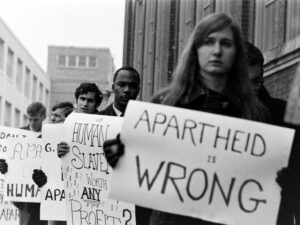One of our key tenets at Larger Us is that we should bridge divides rather than deepen them. But are there times when that isn’t true?
What about white supremacists? Or terrorists? Or rapists? Are we really looking for unity with them? Don’t calls for “healing” let them off the hook? Aren’t there some people who should never be part of a larger us?
These are hard questions. There are no neat answers. But here are some thoughts I’ve been mulling over.
1. Them-and-us dynamics are sometimes necessary. I used to think they were always bad. Now, I’m not so sure. Some actions – like rape or murder – are ones we must always stand against. In politics, oppositional dynamics can shine a light on injustices that have been ignored for too long – especially when they’re against an unjust system, as with the struggle against apartheid in South Africa. And in any case, them-and-us dynamics will always crop up in life, given how we’re wired to cluster into groups.
2. No healing can take place without accountability. It’s always moving to see the kind of deep healing that happens in restorative justice encounters between perpetrators and victims of crime, or in truth and reconciliation processes like South Africa’s. But those processes can only work when the perpetrators recognise the harm they’ve done, accept their culpability, and work to repair the damage they’ve caused.
3. We have choices on how we deal with them-and-us dynamics when they arise. Left unchecked, the risk is they spin out of control and take us to very dark places, as in the 1930s or Rwanda in 1994. But the alternative to them-and-us – becoming a larger us that brings in rather than excludes – can’t just mean papering over our differences and sweeping the hard stuff under the carpet. So what does becoming a larger us imply?
4. A lot depends on our idea of “victory”. Whether we’re liberal or conservative, red or blue, left or right, we are going to have disagreements, and we’re going to want to win them. But what does winning look like? Does it necessarily involve defeating the people on the other side? What if we focused instead on winning over – and being open to the possibility that we ourselves may also be changed in the process?
5. Why should we have to win them over? Why should “we” go high when “they” go low – especially if we’re the ones who’ve been on the receiving end of oppression? Answer: because when one side is defeated rather than won over, the seeds of the next battle are so often sown – a battle we may not win. Look at the US’s record of yo-yoing on UN climate treaties since the 90s: Clinton in, Bush out, Obama in, Trump out, Biden in. Look at the Treaty of Versailles. Conflicts have to be transformed rather than just resolved.
6. We need to rethink our idea of “them”. Social media (and news media too, for that matter) excels at pushing the most extreme, angry, threatening views from the other side at us – because it’s great for monetising our attention. But it’s often not a representative picture. It can make our differences seem more insurmountable than they are. And by triggering our own sense of threat, it embeds us more in our own tribal identities, with the potential that we become part of the problem too.
7. We need genuine encounters. We need to steer into our differences rather than avoiding or skirting around them, or raging about them with our allies. We need to talk about our disagreements and understand why they’ve arisen – which involves listening as much as telling, and calling in rather than calling out as Loretta Ross puts it. We need the kinds of conversation that give people space to change their minds – and grant us the space to change our minds on some things too.
8. We need to understand other people’s pain. Henry Wadsworth Longfellow wrote: “If we could read the secret history of our enemies, we should find in each man’s life sorrow and suffering enough to disarm all hostility.” We lose nothing and gain much by understanding why our opponents act as they do – how feelings like loneliness, shame, powerlessness or demoralisation can lead any of us to believe things that aren’t true, or to act in ways ranging from the unkind to the horrific.
9. Each of us needs to acknowledge how we can be part of the problem. I agree with Arthur Brooks when he argues that contempt is a far worse problem than incivility or intolerance. It’s a mixture of anger and disgust – not just for other people’s ideas, but for other people. All of us know how we feel when people display contempt towards us. But social media makes it all too easy to share contempt for others who sit outside our own in-group – as we see every time we open Twitter or Facebook.
10. All this means we need to do our own work too. We have work to do on ourselves, to get better at managing our emotional states and correcting for our cognitive and unconscious biases. Work to do with each other, in building our capacity to listen, empathise and have courageous conversations. And work to do together, to transform society and the world in ways that heal the wounds in our societies. It’s hard, brave work – but it’s essential if we want to be the change we want to see in the world.
(This stuff is what our Larger Us Course is all about – find out more and register your interest in helping us develop the next one here.)


